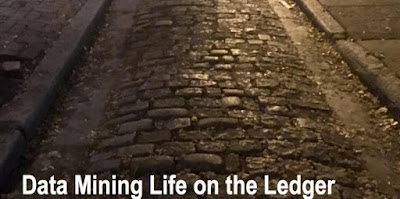by Wrench in the Gears
January 14, 2018
This installment of Building
Sanctuary features digital identity and social credit scoring as it
relates to purchasing and access to life opportunities for citizens living
under authoritarian power structures. This is the fourth in a seven-part series
that follows the digitally-quantified lives of sisters Cam and Li in a a
near-future “Smart” City dystopia. If you wish to start reading from the beginning,
follow this link to the introduction and Part One: Plugging In.
Part Two: A World Without (Much) Work
Part Three: Smart and Surveilled
Solutionists maintain control
over society largely through the ledger. The ledger evolved from Blockchain, a
technology first used to process digital-currency transactions like Bitcoin,
Global Coin’s predecessor. But corporate and government interests saw it had
far greater potential. It started out as a decentralized online system through
which transactions of all sorts (purchases, education credentials, marriages,
property transfers etc.) could be permanently recorded in blocks that were secured
by elaborate cryptographic protocols. Over time, private blockchains came to
dominate the system. These were gradually consolidated by those allied with the
Solutionist agenda.
Now there is one ledger that
keeps track of everything and everyone: inputs and outputs; ownership and debt;
locations, activities, functions, and compliance. The ledger is the master
accountant that is everywhere and nowhere. It lives on a distributed system of
computers. It’s promoted as infallible, untouchable. The Solutionists suppress
any information that might undermine public faith in it. In a world of
uncertainty, the ledger is a held up as a symbol of unquestioning trust.
In addition to facilitating and
recording transactions, the ledger also calculates citizen scores, something no
one with a Citi Badge can escape. These scores rise and fall based the data
each person generates within the Solutionists’ “smart systems.” People are
constantly evaluated against the norms set by the authorities. If your
behavior, or that of your family or even friends or acquaintances, deviates
from these standards, your score drops.
People who question the system
have low scores. People with extensive social networks have low scores. People
who travel widely have low scores. People who access “the wrong” online
materials have low scores. People who are financially unstable have low scores.
Your score can be lowered for being too educated or not educated enough. People
who use public services have low scores. If you have a low score, you become a
target of social impact interventions, programs underwritten by private
investors designed to bring your score up and reorient you to the values
Solutionist society demands.
Citizen scores determine access
to jobs, housing, leisure opportunities, and social relationships. They affect
the prices people pay for goods and services and even the type of education and
medical treatment they get. At birth Cam and Li, like everyone born outside a
sanctuary zone, were assigned unique identity numbers linked to retinal scans
and were each issued a Citi Badge. Their Citi Badges are connected to the
ledger and hold funds from their Global Coin government stipend, student
vouchers, and data currency transactions.

No comments:
Post a Comment